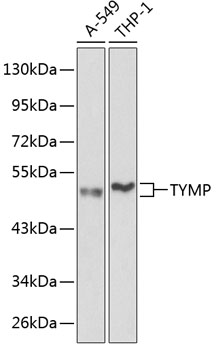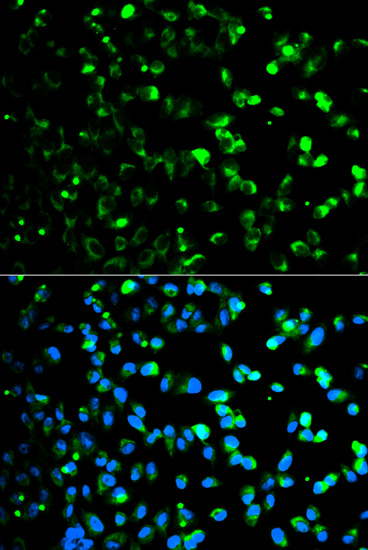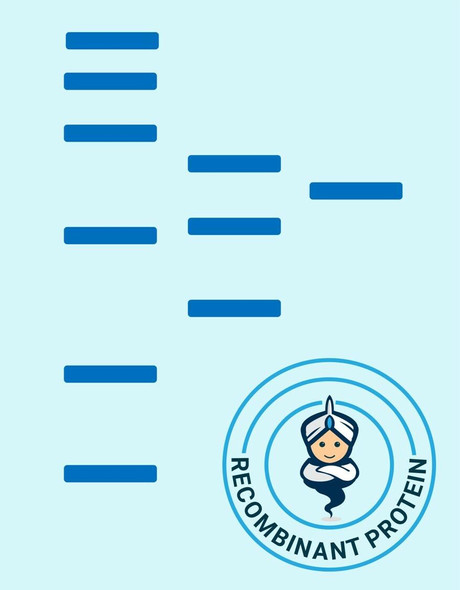Anti-TYMP Antibody (CAB1094)
- SKU:
- CAB1094
- Product type:
- Antibody
- Reactivity:
- Human
- Host Species:
- Rabbit
- Isotype:
- IgG
- Antibody Type:
- Polyclonal Antibody
- Research Area:
- Cardiovascular
Frequently bought together:
Description
| Antibody Name: | Anti-TYMP Antibody |
| Antibody SKU: | CAB1094 |
| Antibody Size: | 20uL, 50uL, 100uL |
| Application: | WB IF |
| Reactivity: | Human |
| Host Species: | Rabbit |
| Immunogen: | Recombinant fusion protein containing a sequence corresponding to amino acids 1-200 of human TYMP (NP_001107228.1). |
| Application: | WB IF |
| Recommended Dilution: | WB 1:500 - 1:2000 IF 1:50 - 1:200 |
| Reactivity: | Human |
| Positive Samples: | A-549, THP-1 |
| Immunogen: | Recombinant fusion protein containing a sequence corresponding to amino acids 1-200 of human TYMP (NP_001107228.1). |
| Purification Method: | Affinity purification |
| Storage Buffer: | Store at -20°C. Avoid freeze / thaw cycles. Buffer: PBS with 0.02% sodium azide, 50% glycerol, pH7.3. |
| Isotype: | IgG |
| Sequence: | MAAL MTPG TGAP PAPG DFSG EGSQ GLPD PSPE PKQL PELI RMKR DGGR LSEA DIRG FVAA VVNG SAQG AQIG AMLM AIRL RGMD LEET SVLT QALA QSGQ QLEW PEAW RQQL VDKH STGG VGDK VSLV LAPA LAAC GCKV PMIS GRGL GHTG GTLD KLES IPGF NVIQ SPEQ MQVL LDQA GCCI VGQS EQLV PADG ILYA |
| Gene ID: | 1890 |
| Uniprot: | P19971 |
| Cellular Location: | |
| Calculated MW: | 49kDa/50kDa |
| Observed MW: | 50kDa |
| Synonyms: | TYMP, ECGF, ECGF1, MEDPS1, MNGIE, MTDPS1, PDECGF, TP, hPD-ECGF |
| Background: | This gene encodes an angiogenic factor which promotes angiogenesis in vivo and stimulates the in vitro growth of a variety of endothelial cells. It has a highly restricted target cell specificity acting only on endothelial cells. Mutations in this gene have been associated with mitochondrial neurogastrointestinal encephalomyopathy. Multiple alternatively spliced transcript variants have been identified. |
| UniProt Protein Function: | ECGF1: May have a role in maintaining the integrity of the blood vessels. Has growth promoting activity on endothelial cells, angiogenic activity in vivo and chemotactic activity on endothelial cells in vitro. Homodimer. Belongs to the thymidine/pyrimidine-nucleoside phosphorylase family. |
| UniProt Protein Details: | Protein type:Motility/polarity/chemotaxis; Nucleotide Metabolism - pyrimidine; EC 2.4.2.4; Phosphorylase; DNA replication; Transferase; Cytokine; Xenobiotic Metabolism - drug metabolism - other enzymes Chromosomal Location of Human Ortholog: 22q13.33 Cellular Component: cytosol Molecular Function:phosphorylase activity; platelet-derived growth factor receptor binding; transferase activity, transferring pentosyl groups Biological Process: DNA replication; mitochondrial genome maintenance; pyrimidine nucleoside catabolic process; pyrimidine nucleoside salvage; pyrimidine nucleotide metabolic process Disease: Mitochondrial Dna Depletion Syndrome 1 (mngie Type) |
| NCBI Summary: | This gene encodes an angiogenic factor which promotes angiogenesis in vivo and stimulates the in vitro growth of a variety of endothelial cells. It has a highly restricted target cell specificity acting only on endothelial cells. Mutations in this gene have been associated with mitochondrial neurogastrointestinal encephalomyopathy. Multiple alternatively spliced transcript variants have been identified. [provided by RefSeq, Apr 2012] |
| UniProt Code: | P19971 |
| NCBI GenInfo Identifier: | 67477361 |
| NCBI Gene ID: | 1890 |
| NCBI Accession: | P19971.2 |
| UniProt Secondary Accession: | P19971,Q13390, Q8WVB7, A8MW15, H9KVA0, |
| UniProt Related Accession: | P19971 |
| Molecular Weight: | 50,405 Da |
| NCBI Full Name: | Thymidine phosphorylase |
| NCBI Synonym Full Names: | thymidine phosphorylase |
| NCBI Official Symbol: | TYMP |
| NCBI Official Synonym Symbols: | TP; ECGF; ECGF1; MNGIE; MEDPS1; MTDPS1; PDECGF; hPD-ECGF |
| NCBI Protein Information: | thymidine phosphorylase |
| UniProt Protein Name: | Thymidine phosphorylase |
| UniProt Synonym Protein Names: | Gliostatin; Platelet-derived endothelial cell growth factor; PD-ECGF; TdRPase |
| UniProt Gene Name: | TYMP |
| UniProt Entry Name: | TYPH_HUMAN |









